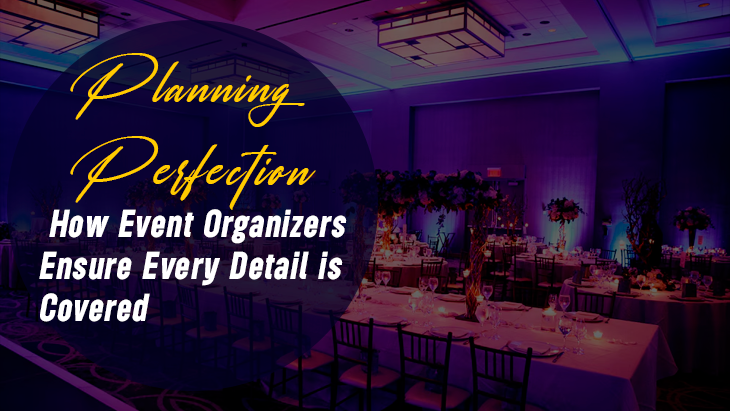Event organizers are prima donnas in the sense of putting together a successful event. They can go all the way from small, intimate gatherings to huge conventions. Their turf is not merely creativity but in minute planning and execution. Let's get into this complex world of event planning and learn how organizers make sure that all those details come together for something unforgettable.
Planning
Event planning can be likened to a symphony wherein every single note had to be put together to create a perfect result. Here, weddings and corporate meetings could be one end of the spectrum, while festivals or product launches form another; the stakes were high. One false note can mean disappointments, financial loss, or reputational damage. Consequently, the first step in this process of event organizing involves making sense of the set objectives and vision of the event. Of course, this basic knowledge leads on to govern the rest of the choices, starting from venue selection to the guest list management.
Define clear goals
Of course, proper events are expected to be provided with clear and measurable goals. Whether it is a cause that needs to be created, the launch of some new product, or even a milestone, these goals form the framework of the event. An organizer usually works with a client to determine clear, specific objectives like the number of people one expects to attend an event, how much budget is available, and key messages.
Budget Preparation
Next there is the budgeting aspect. A good budget is that formative foundation that controls all the financial activities in the course of event planning. Funds need to be raised by the financial authorities for venue, catering, entertainment, marketing, and technology. They also have to predict the existence of additional costs and must prepare a contingency fund so as to encounter unexpected costs. Hence, the detailed budget helps in controlling the expenses but also aids one to rank the available resources so that one can effectively meet the objectives of the event.
Selection Venue
It often sets the tone for the event as a whole. The choice could be to add to the theme, accommodate a comfortable number of guests, and provide even necessary facilities for such an event. Here are some factors that an event organizer considers before making an option on choosing a venue:
Capacity: The venue must comfortably fit the number of guests expected in it.
Accessibility: Easily accessible for all such guests, particularly those with special needs.
Add on provisions. Parking, audio, and visual equipment options for catering to be considered
Ambiance Ambiance must correspond to the aesthetic appeal of the theme and branding of the event.
Site Visits Before making a final decision, the organizers conduct site visits. The experiential visit will allow them to view the venue, give them an aspect of the venue, let them appreciate its layout, and get a sense of the logistical needs. It also avails an opportunity to meet the venue staff, which has immense value in establishing a cooperative relationship that precedes the event.
Management of Logistics
With a venue in place, logistics the key issue of accuracy are next in the picture. It involves how visitors are going to get there and stay there, plus their scheduling and coordination on site. This is what follows: some critical components related to logistics;
Guest Management One should always monitor the guest list. Be careful. Most event management systems have features that allow organizers to deal with registrations, track RSVPs, and remind guests. One should also keep the guest aware of everything through proper communication; even personally extended invitations may encourage guest response.
Catering and Menu Planning
One of the areas where food and drinks connect best with guests' expectations is in the provision of food and drinks. The organizer says a word about diet needs, preferences, and even the theme for the event while designing menus. Tastings and contracts with caterers ensure that the quality as well as the service standards are provided.
Audio-visual and technology needs
Technology is an important medium for modern events. The planners have to settle on the audio-visual package required by them for their presentations, performances, or entertainment. That would include internet facilities, sound, and lighting rigs. Planning with the tech vendors well in advance can help avoid last-minute hassles.
Marketing and Promotion
Great marketing does call for the attraction and promotion of attendance and buzz. Ultimately, organizers may have a precise marketing plan that might even include:
Social Media Campaigns: directly reaching out to the target audience by running particular advertisements and engaging with posts.
Email Marketing: Sending out invitations and updating emails to the guest list
Partnerships: connecting with influencers or other organizations to amplify reach
Branding
The event should reflect in the branding all aspects of its promotional materials, decoration, and much more. The organizing ensures that the logo, color palette, and messages are relevant and thus should be consistent and build a coherent experience that follows through to every attendee.
On-site Coordination
After all preparations and coordination, the next stage would be the coordination on-site, which should occur on the event date. All careful preparation would be achieved in this stage. Coordinators are given instructions to regulate the speed at which the event goes on, which would then ensure everything gets down appropriately. Major duties of this stage include:.
Setup and Rehearsals
The organizers determine the place of control, which involves seats, stages, and other kinds of decorations. Speakers or performance rehearsals will ensure each person knows his role and when to perform them.
Troubleshooting
There is always something that, no matter how well planned, can crop up to challenge the best of them. Skilled organizers are adept at thinking on the run and quickly resolve problems as they arise. Be it a sudden change of weather or a technical glitch, having contingency plans in place makes some differences.
Guest Engagement
Indeed, most event organizers will pay close attention to making their guests feel well-received and engaged on the day. This will include managing check-in at the event and answering guests' questions, and the aim could even extend to facilitating networking opportunities. The better the guest experience, the more likely the event will be a success
Event Evaluation
The event would have gone by, but weeks later, the organizers should assess if they had achieved what they initially set out for. This may include surveying those who attended, analyzing the attendance and registration figures, as well as financial returns. Analysis of what actually went wrong and right at this stage would only be indicated by showing places to be re-refined for the next event.
Thank You and Follow-Up
Thus, this is why a well-planned follow-up procedure can be thought of as very crucial in keeping relationships with the guests and other stakeholders. Some examples would be sending thank-you notes, releasing happenings during the event, and requesting feedback from participants about their experience.
Conclusion
Serv-horizon event designing is thus that complex, multi-faceted profession requiring the perfect blend of creativity, strategic planning, and attention to detail. Be it the setting of a goal, budgeting, logistics, or even the post-event evaluation, an event designer takes care of all the minute details to make sure that absolutely nothing goes unnoticed. What do you get? Heart-touching experiences and just the right set of objectives are being turned on. Whether it is a small gathering or a grand conference, the depth of the entire process of planning perfection does indeed make all the difference.






Leave a reply